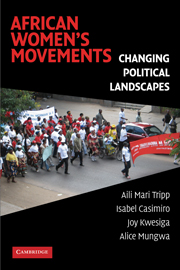Book contents
- Frontmatter
- Contents
- List of Tables
- Acronyms
- Preface
- 1 Introduction
- 2 Historic Influences on Contemporary Women's Movements
- 3 The Rise of the New Women's Movements
- 4 The Challenge of New Women's Movements
- 5 Women's Movements and Constitutional and Legislative Challenges
- 6 In Pursuit of Equal Political Representation
- 7 Engendering the State Bureaucracy
- 8 Women's Movements Negotiating Peace
- 9 African Women's Movements and the World
- Bibliography
- Index
- References
Bibliography
Published online by Cambridge University Press: 10 January 2011
- Frontmatter
- Contents
- List of Tables
- Acronyms
- Preface
- 1 Introduction
- 2 Historic Influences on Contemporary Women's Movements
- 3 The Rise of the New Women's Movements
- 4 The Challenge of New Women's Movements
- 5 Women's Movements and Constitutional and Legislative Challenges
- 6 In Pursuit of Equal Political Representation
- 7 Engendering the State Bureaucracy
- 8 Women's Movements Negotiating Peace
- 9 African Women's Movements and the World
- Bibliography
- Index
- References
- Type
- Chapter
- Information
- African Women's MovementsTransforming Political Landscapes, pp. 231 - 250Publisher: Cambridge University PressPrint publication year: 2008

